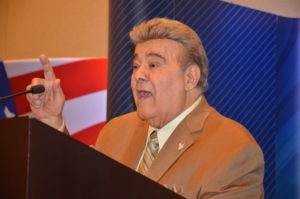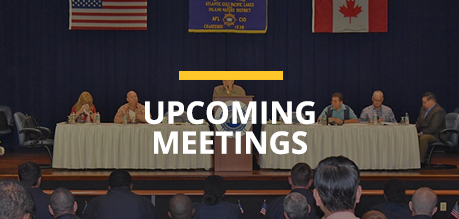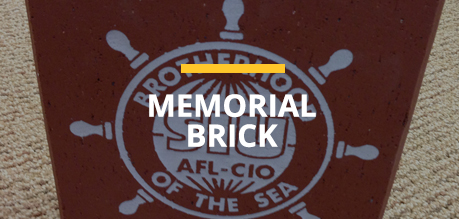Under the leadership of President Michael Sacco, the SIU steadily moved forward in 2018, with a list of accomplishments that included adding new jobs, ratifying solid contracts, improving its affiliated school in southern Maryland, opening a new hiring hall in Puerto Rico and helping lead the fight to defend cabotage laws.

SIU President Michael Sacco
The latter issue produced some of last year’s biggest headlines, and involved (among other efforts) one study concerning the Jones Act’s effect on Puerto Rico, and a separate, longer-term examination of cabotage laws around the world. Economists from Boston-based Reeve & Associates and San Juan-based Estudios Técnicos, Inc. on July 18 released a joint report, “The Impact of the Jones Act on Puerto Rico,” that concluded the Jones Act has no impact on either retail prices or the cost of living in Puerto Rico. In addition, the report found that the state-of-the-art maritime technology, Puerto-Rico focused investments, and dedicated closed-loop service offered by Jones Act carriers provide a significant positive economic impact to the island, at freight rates lower or comparable to similar services to other Caribbean Islands.
These findings factually shot down claims to the contrary from Jones Act opponents, who seemingly blame the time-tested law for every problem under the sun and whose main strategy apparently is to repeat lies loudly and often.
Later in the year, Seafarers’ Rights International (SRI), an independent center for mariner advocacy and research, released its full report – “Cabotage Laws of the World” – on the findings of their global cabotage study. The study, commissioned by the International Transport Workers’ Federation (ITF), provides the first independent analysis of maritime cabotage laws since the early 1990s.
Based on extensive research involving 140 countries, the SRI report revealed that 91 countries representing 80 percent of the world’s coastal United Nations Maritime States have cabotage laws restricting foreign maritime activity in their domestic coastal trades.
Merriam-Webster defines cabotage as “trade or transport in coastal waters or airspace or between two points within a country.”
ITF Seafarers’ Section Chair David Heindel, who also serves as the SIU’s secretary-treasurer, said, “The lack of accurate facts on cabotage laws around the world has been an impediment for policymakers considering implementing cabotage laws. This report represents a circuit breaker, providing policymakers with the relevant facts for proper decision-making. The SRI report debunks the myth that cabotage is an exception, not the rule. Laws governing maritime activity are widespread, currently existing in 91 countries covering 80 percent of the world’s coastlines of U.N. maritime states. We know there are a number of countries considering introducing, strengthening or diminishing cabotage regulation. This report will assure those governments that it makes sense to enforce national cabotage laws.”
Additionally, the SIU testified or otherwise supported several U.S. congressional hearings covering the Jones Act, cargo preference, and other laws and programs that are vital to the U.S. Merchant Marine.
The union threw its full support behind a new bill, the Energizing American Shipbuilding Act, which would boost shipboard jobs as well. Championed by U.S. Rep. John Garamendi (D-California), the bill has strong bipartisan support and legitimate prospects for approval in the new year.
Not all of the news from the nation’s capital was positive for maritime or the labor movement. The Supreme Court ruled against working families with its long-awaited decision in the Janus case. However, unions have responded by significantly ramping up efforts to remind workers of the ongoing extreme relevance of unions.
There were victories, too, both in the U.S. and in Canada. Missouri citizens soundly rejected a statewide, so-called “right to work” law. Meanwhile, the SIU of Canada led the way in winning major cabotage rights for that nation’s mariners.
Also, the annual report from the U.S. Bureau of Labor Statistics showed that union membership grew by 262,000 in 2017 (the most recent year for which data was available).
New Ships
Seafarers and SIU CIVMARS welcomed many new vessels throughout the year, plus the start of construction on several ships.
Crowley acquired three tankers (Oregon, Washington, California) from SeaRiver mid-year, and later christened the ConRo El Coqui.
Matson launched the Daniel K. Inouye, the largest containership built in the U.S. (850 feet). Construction also started on the Matsonia, a ConRo.
The general cargo ship SLNC York (Argent Marine) reflagged under the Stars and Stripes, while the first steel plates were cut for the Pasha Hawaii Jones Act containership George III.
SIU Government Services Division members had much to applaud, including the christenings of the expeditionary fast transports USNS Burlington and USNS Puerto Rico, and the start of construction on the fleet replenishment oiler USNS John Lewis and the expeditionary sea base USNS Miguel Keith.
New Contracts and Benefits
It was a banner year for the Seafarers Health and Benefits Plan (SHBP), which bookended 2018 by announcing assorted new benefits for Seafarers and their dependents. The SHBP also awarded nine scholarships worth a combined $132,000. Four of the grants went to Seafarers, while the other five were claimed by SIU family members.
SIU negotiating teams continued to defy nationwide trends by securing agreements that feature regular wage increases while maintaining or increasing benefits. Such was the case both at Great Lakes Dredge & Dock, where members ratified a five-year contract; and at G&H Towing, where SIU boatmen approved a three-year pact.
Piney Point
The union-affiliated Paul Hall Center and its Seafarers Harry Lundeberg School of Seamanship continued pressing ahead to set the standard for maritime training. Located in Piney Point, Maryland, the school introduced a new class for storekeepers and launched a totally revamped steward department curriculum – collectively dubbed Culinary 2.0 – that was a hit with the first students.
In the fall, the Paul Hall Center also hosted a packed meeting of the U.S. Transportation Command’s executive working group on the Voluntary Intermodal Sealift Agreement. The group includes SIU Executive Vice President Augie Tellez.
In May, the school’s advisory board examined current and future training needs, and discussed various upgrades being made to both the campus itself and the classes. The board includes representatives from the union, school, ship-operating companies and government agencies.
That same month, Piney Point was the site for the sixth annual Seafarers Waterfront Classic. The event benefits the American Military Veterans Foundation (AMMILVETS), previously called the Wounded Warriors Anglers of America.
New Hall and More
On Nov. 8, the SIU officially opened the new hiring hall in San Juan, Puerto Rico, with an event that included food, drinks and a live band.
“Welcome to your brand-new SIU union hall,” SIU Port Agent Amancio Crespo began, before being interrupted by cheers and applause from the more than 150 members, elected officials, company executives and guests gathered outside the building for the ceremony.
The new facility, located at 659 Hillside Street in the Summit Hills neighborhood of San Juan, is immaculate, with all-new furniture in multiple member lounge areas, wheelchair-accessible restrooms, a modern galley and mess area, WiFi access and a second-floor conference room. Most importantly, it’s in a safe and secure neighborhood – a huge improvement from the previous hall.
In other news, the SIU remained very active with the ITF, and Heindel was re-elected as chair of the federation’s Seafarers’ Section at its congress in Singapore.
Several SIU crews upheld the finest traditions of the Brotherhood of the Sea by executing rescues, including Seafarers from the USNS Trenton, USNS Wally Schirra and multiple NY Waterway ferries.
The National Transportation Safety Board published a summary of its investigation of the El Faro tragedy. Two books (by private authors) were published about the October 2015 sinking. Later in the year, the SIU conducted and participated in memorial services at sea and ashore for the 33 individuals (including 17 Seafarers) who lost their lives in the sinking.
Two longtime Seafarers called it quits: SIU Vice President Government Services Kermett Mangram retired after 40 years with the union, and SIU Assistant Vice President Contracts Archie Ware did the same, also capping a 40-year career. Former UIW National Director Kate Hunt made history when she succeeded Mangram, becoming the union’s first female vice president.
Seafarers continued their philanthropy across the globe, including annual efforts in Tacoma, Washington, and Fort Lauderdale, Florida.
The Maritime Trades Department conducted a Jones Act-themed winter meeting, helping set the record straight on a law that is vital to U.S. national, economic and homeland security.
Finally, the union bid a solemn farewell to Charlie Stewart, retired vice president and former NMU official, who passed away at age 84.





Comments are closed.